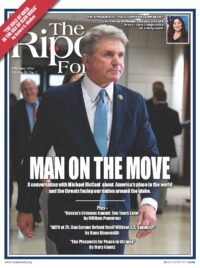 The convergence of the ten-year landmark of Russia’s annexation of Crimea — coupled with the two-year anniversary of Russia’s invasion of Ukraine — has focused renewed attention on the origins of the Russian-Ukraine war. Hindsight is always 20/20, but the warning signs were visible from the beginning of Ukraine’s independence that Russia was not reconciled to this historical realignment.
The convergence of the ten-year landmark of Russia’s annexation of Crimea — coupled with the two-year anniversary of Russia’s invasion of Ukraine — has focused renewed attention on the origins of the Russian-Ukraine war. Hindsight is always 20/20, but the warning signs were visible from the beginning of Ukraine’s independence that Russia was not reconciled to this historical realignment.
Ukrainian statehood has many authors, but I will start with the 1990 national referendum which voted overwhelming for independence. Crimea approved the referendum, but by a smaller margin. Nevertheless, this plebiscite in his back pocket, Ukrainian President Leonid Kravchuk was able to resist the entreaties of President Boris Yeltsin at the Belovezha Forest meeting to keep the Soviet Union together. Instead, the Commonwealth of Independent States was formed with minimal Ukrainian participation and enthusiasm.
In retrospect, two events raised questions about the long-term prospects of Ukraine’s independence. First, after the break-up of the Soviet Union, Ukraine engaged in multiple negotiations with Russia about the control of the Black Sea fleet and the Russian naval bases now situated in a foreign country. After much back and forth, Russia bought the fleet in 1995 and received a long-term lease that left behind a garrison of Russian troops on Ukrainian territory. Second, Ukrainian independence was only backed-up by the 1995 Budapest Memorandum signed by Russia, the United Kingdom, and the United States. This document enabled the removal of nuclear weapons from Kazakhstan, Belarus, and Ukraine. It also provided “security assurances” (but not guarantees) for any violation of the territorial integrity of those three new nations. In other words, it was largely a toothless declaration.
Hindsight is always 20/20, but the warning signs were visible from the beginning of Ukraine’s independence that Russia was not reconciled to this historical realignment.
So Ukraine always remained vulnerable to Russian revanchism, which began from the start of the end of the Soviet Union. Critics cited Catherine the Great’s conquest of the peninsula. Other detractors criticized the 1954 transfer of Crimea to Ukraine under Nikita Khrushchev, which occurred for administrative reasons but did not displace anyone since Crimea remained a part of the Soviet Union and not another country. Finally, prominent Russian leaders, such as the mayor of Moscow, Yuri Luzhkov, sought political advantage by insisting that Crimea should be returned to the Russian Federation.
Fast forward a couple of decades and the 2015 Maidan revolution. Ukraine was at war with Russia and on the verge of defeat. Ukraine survived, and a cease fire was ultimately established, but only after signing the odious Minsk agreements. These protocols created a working group of four countries (France, Germany, Russia, Ukraine). Notably absent at the signing was the United States. And so the West just watched as the “little green men” with no insignias retook Crimea without a fight.
So the opportunity to defend Ukraine – or at least provide some substance to the Budapest Memorandum – was lost. Instead, although the West introduced some sanctions, it generally was business as usual between Russia and Europe with the consequence that Europe became increasingly reliant on Russian energy. Thus, there were no economic consequences for Russia’s flagrant violation of international law.
Alas, the signs were there that Putin would not stop with Crimea. Any attempt to revive the Minsk accords after 2015 was a non-starter, since Russia demanded veto rights over any national legislation for Donetsk and Lugansk, an impossible position for a sovereign state. The 2022 constitutional amendments also included new extraterritorial provisions, which stated that once a region joined the Russian Federation, it could not give up any land that was part of its territory. Therefore, there was no legal room for any negotiations. Furthermore, the amendments asserted that the Russian Federation was allowed to defend ethnic Russians living abroad.
Going forward, we must understand that we are in a whole new world after Russia’s annexation of Ukrainian territory.
Putin had ample evidence that the United States and Europe would not come to the defense of Ukraine, nor did he respect Ukraine as a military power. He reportedly thought he would be in Kyiv in two weeks, but the war is now approaching its two-year anniversary with no end in sight. Instead, Putin created false narratives of Nazis in Ukraine and attacks in Ukraine on ethnic Russians. Critics of the U.S. and European Union also claim that Russia was provoked by the talk of potential NATO or EU enlargement, although neither event was in any way imminent and still subject to long negotiations.
Opportunities were clearly lost to confront Russia for its aggression, although questions remain as to whether the interests of the U.S and Europe were closely aligned. Going forward, however, we must understand that we are in a whole new world after Russia’s annexation of Ukrainian territory. We long thought imperialism was over after World War I and World War II, but it will take more than Cold War deterrence to confront Russia’s growing imperial appetites. And there are more trip wires that could escalate the crisis at any time.
Putin built a 12-mile bridge across the Kerch strait to connect the Russin mainland to Crimea. Ukraine has attacked the bridge several times, and it remains a sitting target that, if further attacked, would both physically and symbolically undercut Putin’s great military victory. Meanwhile, Russia continues to try to re-write history to justify its annexation of Crimea.
Indeed, Russia continues to litigate Khrushchev’s transfer of Crimea to Ukraine some 70 years after the fact.[1] No internal legislation, however, can whitewash or justify the blatant violation of international law that occurred in Crimea ten years ago.
William Pomeranz is the Director of the Kennan Institute, a part of the Woodrow Wilson International Center for Scholars located in Washington, D.C. He is also the author of Law and the Russian State: Russia’s Legal Evolution from Peter the Great to Vladimir Putin (Bloomsbury, 2018).
_________________________________
[1] “Konstitutionnyi sud poprosiat otmemenit’ peredach Kryma Ukrainskoi SSR, at: May 16,2023, Kommersant, availble at : Конституционный суд попросят отменить указ о передаче Крыма Украинской ССР – Ведомости (vedomosti.ru)




